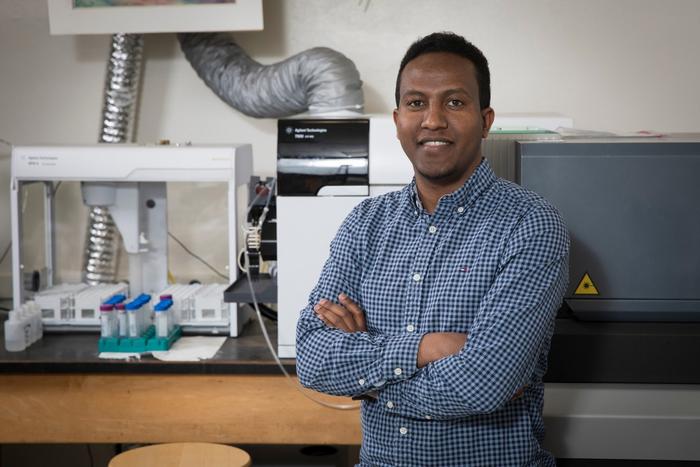BINGHAMTON, N.Y. — Sea salt hides a secret: tiny droplets of the seawater from which it came, preserving geologic history.

Credit: Binghamton University, State University of New York
BINGHAMTON, N.Y. — Sea salt hides a secret: tiny droplets of the seawater from which it came, preserving geologic history.
Using specializing equipment obtained from National Science Foundation grant funds, Mebrahtu Weldeghebriel, PhD ’22, a postdoctoral fellow at Princeton University, and Binghamton University Distinguished Professor of Earth Sciences Tim Lowenstein were able to reconstruct changes in seawater chemistry over the last 150 million years, also gaining insight into related geological processes and climate changes. Their article, “Seafloor Hydrothermal Systems Control Long-Term Changes in Seawater [Li+]: Evidence from Fluid Inclusions,” was recently published in the journal Science Advances.
The ocean “is like a giant soup of different elements,” Lowenstein explained. “Sodium and chloride are the most common ones, but there are dozens of others dissolved in seawater in trace amounts such as lithium.”
They looked at sea salt (halite) formed at various times over the past 150 million years in geographically diverse sedimentary basins in the United States, Europe, Asia and Africa. Within the salt samples were tiny pockets containing a bit of ancient seawater.
To access the tiny droplets, the researchers used a laser to drill holes into the salt crystals and then a mass spectrometer to analyze the different trace elements present. In this research, they focused specifically on the concentration of lithium, a trace element that sustained a seven-fold decrease over the past 150 million years, paralleled by a rise in magnesium to calcium ratios.
But why?
The cause for the long-term variations in seawater composition has been debated for the past two decades. The researchers proposed that the decline in lithium concentration in seawater is mainly associated with reduced production of oceanic crust and decreased seafloor hydrothermal activity, both of which are influenced by the movements of tectonic plates. The slowdown in plate activity over the past 150 million years led to less lithium being added to the ocean and reduced amounts of carbon dioxide released into the atmosphere, which ultimately led to global cooling and the present ice age. Turning back the clock 150 million years, the earth was a warmer place with more carbon dioxide in the atmosphere and more lithium in the sea.
“There is a close link between ocean chemistry and atmospheric chemistry,” Weldeghebriel said. “Whatever changes happen in the ocean also reflect what’s happening in the atmosphere.”
Overall, Weldeghebriel and Lowenstein’s research has made a significant advance in understanding the chemistry of Earth’s ancient oceans and how the movement of tectonic plates has influenced the composition of our Earth’s hydrosphere and atmosphere. Such chemical changes impact biology, as well, such as the marine creatures that build their shells out of calcium carbonate.
“The oceans and atmosphere are connected to one another, and how they change is related,” Lowenstein explained. “Everything is connected.”
Journal
Science Advances
DOI
10.1126/sciadv.adf1605
Article Title
Seafloor Hydrothermal Systems Control Long-Term changes in Seawater [Li+]: Evidence from Fluid Inclusions
Article Publication Date
26-Jul-2023




